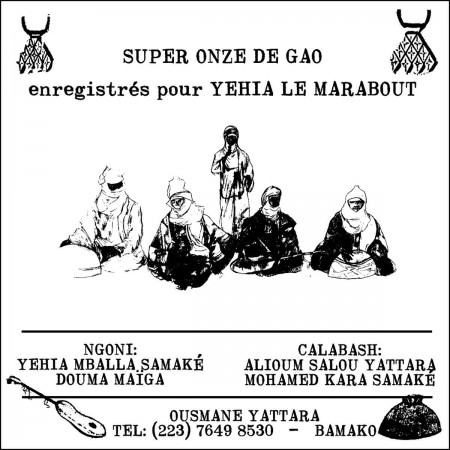The desert guitar of the sahel is progressively reaching a wider audience outside of its geographical confines. Acts like Tinariwen have recorded with American artists and won Grammys (see our review of their latest album here), while guitar maestro Omar "Bombino" Moctar recently performed at the NPR studios. There is even a Tamasheq adaptation of Prince's iconic biopic "Purple Rain" in the works. However, not everyone in the desert plays the guitar.
Takamba is different. For uninitiated, takamba is a style of music from the Songhai and Tuareg peoples of the Northern region of Mali. It can be found in Gao and Timbuktu accompanying naming ceremonies and weddings, or really anywhere people want to have a good time. A form of the praise singing found throughout the country, in its most modern form, the style snakes its way through fuzzed out, overdriven amplifiers and weatherworn loudspeakers.
Despite these late 20th century modifications, it is ancient form, often played on handmade instruments that- aside from the odd contact mic, haven't changed in centuries. The lead instrument is a four or five stringed lute called an ngoni in Bambara or tehardent in Tamasheq. It has a fretless neck, one drone string and is plucked. The traditional technique, prominently featuring hammer-ons, allows for a flurry of notes in quick succession. The accompanying percussion is played on a calabash, half of a large gourd that is struck with a fist, open palm, or metallic rings to create takamba's uniquely loping rhythm. At its core, this is a music made up of repetition and shift, with looped harmonic and rhythmic patterns starting, stopping, and weaving in and out of each other in a constantly moving musical landscape.
Although Takamba has been widely popular in Mali since the rise cassette culture, with a few exceptions, its received fairly short shrift in the ears of the west. To rectify this, we are pleased to present two fantastic releases raring for you to check out.
First up, the good folks over at Sahel Sounds are presenting a digital/vinyl release from the group Super Onze de Gao, arguably the masters of Songhi takamba. More than simply a band, Super Onze is an institution, with membership passed down from father to son. Click here for some great footage of an iteration of the group in the 70's. The group features a dual ngoni and calabash lineup common to the style. This release was taken from a cassette tape found in one of Mali's now disappearing tape markets, recorded originally in the early 1990s. We are presented with minimal information to accompany the music. There are no track names; just Side A and Side B. The music is intense, raw and urgent, yet subdued. The fuzz of the overdriven amplifiers mixes with the distortion of the tape to evoke the barrenness of the landscape. With each track clocking in at over 23 minutes, the listener can be easily transported to the starkness of the Sahara.
Next is the debut release from Tuareg musician Abellow Yattara's project called Al Bilali Soudan out on Forced Exposure/Clermont Music. An acknowledged master instrumentalist, Yattara paid his dues playing with numerous Malian musicians, including the Orchestre De Tombouctou, Khaira Arby and the the late Ali Farka Toure. Now he is in the spotlight, leading his own group. The group consists of two calabash players and a bass ngoni, which provides a strong bottom to Yattara's dexterous playing. The music retains a similar intensity and urgency while remaining loose and dreamlike. Melodic phrases spiral around and on top of each other while shouts of ecstatic joy and proddings are peppered amid the the more traditional praises. Though the record is broken up into ten tracks, the music can easily blend together, sustaining the desert vibe for the entire album.
Be sure to check out both of these releases. Takamba is a style that deserves a wider audience. It is at once meditative and full of raw energy; a unique innovation born from the singular desert environs. Enjoy.










